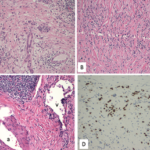“The goal of creating this International Consensus Guidelines Statement was to capture the expertise of clinicians and clinical investigators from across the world with extensive experience in the management and treatment of IgG4,” says Dr. Khosroshahi, adding that the guidelines are intended to help inform clinical management of this disease worldwide until better cohort and prospective studies are conducted.
Takeaway for Rheumatologists
One key message highlighted by the findings of the consensus statement is the importance of accurate and early diagnosis to ensure optimal management of the disease that can affect many organs.
The senior author of the study, John H. Stone, MD, MPH, professor of medicine, Harvard Medical School, director of clinical rheumatology, Massachusetts General Hospital, Boston, emphasized that the guidance statement indicates for the first time that experts agree on a low threshold for initiating treatment in patients with active disease. As shown in Table 1, recommendation No. 3, 87% of experts agreed on the importance of early treatment.
“Although IgG4-related disease generally has a subacute presentation, irreversible injury to some organs can occur within weeks or months if effective therapy is not initiated,” he says, emphasizing that a major goal of therapy identified by the experts is the prevention of fibrosis.
“Once fibrosis is established, therapeutic options are currently limited,” Dr. Stone says.
Clinical manifestations that require urgent therapy, he says, include aortitis, retroperitoneal fibrosis, proximal biliary strictures, tubulointerstitial nephritis, pachymeningitis, type 1 autoimmune pancreatitis and pericarditis.
Commenting on the consensus statement, Eric Matteson, MD, chair of the Division of Rheumatology, Mayo Clinic, Rochester, Minn., highlighted the help offered by the consensus statement in underscoring the numerous conditions associated with IgG4-related disease, as well as the conditions that mimic this disease.
One key message … is the importance of accurate & early diagnosis to ensure optimal management of the disease that can affect many organs …. [I]rreversible injury to some organs can occur within weeks or months if effective therapy is not initiated.
He also stresses the importance of prompt treatment. “The guidelines help emphasize the need for recognition of, and prompt and aggressive treatment of the disease, which substantially limit the organ damage and comorbidities associated with it,” he says.
To help make the diagnosis, Dr. Stone emphasizes the need for close collaboration between clinicians and pathologists because neither clinical nor pathologic findings alone are sufficient for diagnosis in most cases.
“I find it enormously helpful to sit at the microscope with the pathologist and review biopsy slides myself,” he says, adding that the collaboration is equally beneficial to the pathologist and generates a “remarkable synergy.”


